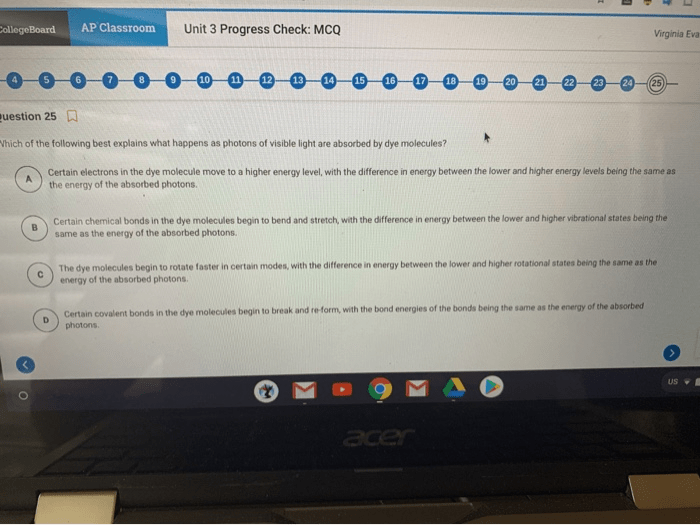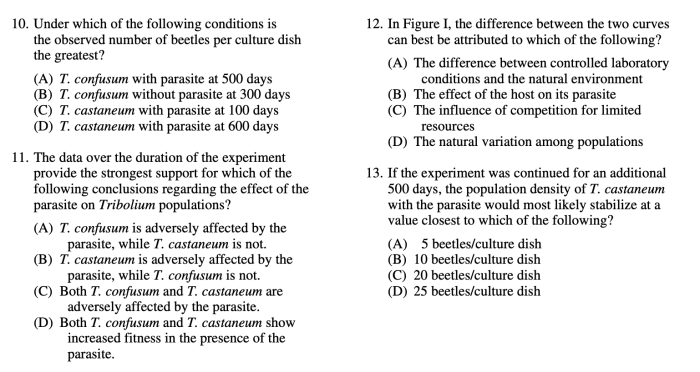Embark on a journey into the realm of Unit 5 Progress Check MCQ AP Biology, an assessment designed to gauge your understanding of fundamental biological concepts and advanced topics. This comprehensive guide will equip you with an in-depth overview of the test’s structure, content, and strategies for success.
As you delve into this exploration, you will gain valuable insights into the key concepts and skills tested in the MCQ. Our analysis will shed light on the representation of major biological themes and the balance between foundational knowledge and advanced topics.
Unit 5 Progress Check MCQ AP Biology

The Unit 5 Progress Check MCQ AP Biology is a multiple-choice test that assesses students’ understanding of the core concepts covered in Unit 5 of the AP Biology curriculum. The test consists of 50 questions, each with four answer choices.
Students have 60 minutes to complete the test.The topics covered on the test include:
- Cell communication
- Cell cycle
- Meiosis
- Mendelian genetics
- Molecular genetics
The difficulty level of the test is moderate. Students who have a solid understanding of the material covered in Unit 5 should be able to score well on the test. However, students who have not mastered the material may find some of the questions challenging.Students
should be aware of the time constraints of the test. They should pace themselves so that they have enough time to answer all of the questions.
Content Analysis

The Unit 5 Progress Check MCQ for AP Biology assesses students’ understanding of key concepts and scientific principles related to genetics and evolution.
The MCQ effectively represents major biological themes, including:
- Transmission of genetic information
- Variation and inheritance
- Evolutionary processes
- Gene regulation and expression
- Biotechnology and its applications
Balance between Foundational Knowledge and Advanced Topics
The MCQ strikes a balance between foundational knowledge and advanced topics. It covers core concepts essential for understanding genetics and evolution, while also introducing more complex topics that challenge students’ critical thinking skills.
Foundational knowledge tested includes:
- Mendelian inheritance patterns
- Molecular basis of inheritance
- DNA structure and replication
- Natural selection and evolution
Advanced topics include:
- Non-Mendelian inheritance
- Gene regulation and expression
- Population genetics
- Evolutionary history and phylogenetics
By incorporating both foundational and advanced topics, the MCQ provides a comprehensive assessment of students’ understanding of genetics and evolution.
Question Types and Strategies

Multiple-choice questions (MCQs) on the Unit 5 Progress Check for AP Biology encompass various formats, each requiring specific strategies for effective answering.
Categorizing Question Types
- Concept-based questions:Test understanding of biological concepts, principles, and theories.
- Data-based questions:Present experimental data, graphs, or images and require interpretation and analysis.
- Experimental design questions:Evaluate students’ ability to design, interpret, and predict outcomes of experiments.
- Model-based questions:Assess comprehension of scientific models, their strengths, and limitations.
- Application-based questions:Require students to apply biological knowledge to real-world scenarios or novel situations.
Strategies for Answering Different Formats
Concept-based questions:
- Read the question carefully to identify key terms and concepts.
- Recall relevant information from the course material.
- Eliminate answer choices that are clearly incorrect or irrelevant.
Data-based questions:
- Analyze the data carefully, paying attention to trends, patterns, and relationships.
- Identify the dependent and independent variables.
- Consider the context and limitations of the data.
Experimental design questions:
- Understand the purpose of the experiment and the hypothesis being tested.
- Evaluate the experimental design for potential flaws or biases.
- Predict the expected results and explain the rationale.
Model-based questions:
- Comprehend the assumptions and limitations of the model.
- Identify the variables represented in the model.
- Evaluate the model’s ability to explain or predict biological phenomena.
Application-based questions:
- Connect biological knowledge to the real-world scenario.
- Consider multiple perspectives and evaluate the strengths and weaknesses of different approaches.
- Support conclusions with evidence from the course material.
Tips for Eliminating Incorrect Answer Choices
- Look for words like “always,” “never,” or “only”:These indicate absolute statements that are often incorrect.
- Identify vague or ambiguous language:Answers that use terms like “may,” “might,” or “sometimes” are often less reliable.
- Consider the plausibility of the answer:Does the answer make sense given the context and your understanding of the material?
- Process of elimination:If you can confidently eliminate one or more answer choices, your chances of choosing the correct answer increase.
Example Questions

This section presents sample MCQ questions designed to provide a comprehensive assessment of student understanding in Unit 5 of AP Biology. The questions vary in difficulty levels, covering a wide range of topics and question types to simulate the actual exam experience.
The table below presents a selection of these questions, organized according to their difficulty level:
Easy
| Question | Answer Choices | Correct Answer |
|---|---|---|
| Which of the following is a characteristic of all living organisms? |
|
All of the above |
| What is the function of the cell membrane? |
|
To regulate the movement of substances into and out of the cell |
Medium
| Question | Answer Choices | Correct Answer |
|---|---|---|
| Which of the following is NOT a type of passive transport? |
|
Active transport |
| What is the role of ATP in cellular respiration? |
|
To provide energy for the reactions |
Difficult
| Question | Answer Choices | Correct Answer |
|---|---|---|
| Explain how the structure of the ribosome facilitates protein synthesis. |
|
All of the above |
| Discuss the role of genetic variation in the evolution of populations. |
|
All of the above |
Study and Preparation
Effective preparation for the MCQ requires a strategic approach that combines efficient study methods with practice and stress management techniques. By implementing these strategies, students can maximize their understanding of the course material and improve their performance on the exam.
Reviewing Course Materials
- Active Recall:Regularly test yourself on the material without referring to your notes. This forces your brain to retrieve information from memory, strengthening your understanding.
- Spaced Repetition:Review the material at increasing intervals (e.g., 1 day, 3 days, 1 week). This helps move information from short-term to long-term memory.
- Concept Mapping:Create visual diagrams that connect key concepts and ideas. This helps you see the big picture and identify relationships between different topics.
Practice Questions, Unit 5 progress check mcq ap biology
- Official Practice Tests:Utilize the College Board’s official practice tests to familiarize yourself with the exam format and question types.
- Third-Party Practice Questions:Supplement your practice with questions from reputable sources, such as textbooks, online resources, or commercial test prep materials.
- Timed Practice:Practice under timed conditions to simulate the actual exam experience and improve your time management skills.
Time Management and Stress Reduction
- Plan Your Study Time:Create a study schedule that allocates specific time slots for reviewing material and practicing questions.
- Break Down Tasks:Divide large amounts of material into smaller, manageable chunks to avoid feeling overwhelmed.
- Take Breaks:Regular breaks can help improve focus and retention. Use these breaks to relax and clear your mind.
- Deep Breathing Exercises:Practice deep breathing techniques to reduce stress and anxiety before and during the exam.
Applications and Implications: Unit 5 Progress Check Mcq Ap Biology
The MCQ format is widely used in AP Biology to evaluate student understanding of the course content. It is a versatile tool that allows for efficient and objective assessment of a broad range of knowledge and skills.The MCQ results provide valuable insights into students’ strengths and weaknesses.
Educators can analyze the data to identify areas where students have a strong grasp of the concepts and where they need additional support. This information can be used to inform instructional decisions and develop targeted interventions to address specific learning gaps.Furthermore,
MCQs play a significant role in preparing students for college and career readiness. In higher education and professional settings, students are often required to take standardized tests that incorporate MCQs. The experience gained from taking MCQs in AP Biology can help students develop the skills and strategies necessary to succeed on these exams.
Question & Answer Hub
What is the format of the Unit 5 Progress Check MCQ AP Biology test?
The test consists of multiple-choice questions that cover a range of topics in Unit 5 of the AP Biology curriculum.
What is the difficulty level of the test?
The difficulty level of the test varies depending on the specific questions, but overall, it is designed to challenge students and assess their understanding of the material.
What strategies can I use to prepare for the test?
Effective strategies include reviewing course materials, practicing with sample questions, and developing time management skills.